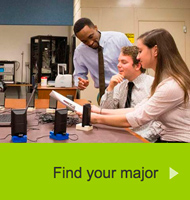Researcher
Katy Owens ('16)
News
‘Even if the results of my undergraduate research project don’t come out as we hoped, I’ve gotten the experience of creating an experiment, working with participants, writing grants. And I’ll be a published undergrad no matter what, whether I get significant results and we wind up in a big-time journal or insignificant results and I submit it to JMU’s undergrad research journal. This has been an amazing experience.’
|
Katy Owens (’16) Major: Minor: Highlights: |
Do you have a specific area of psychology interest?
I’m very behavioral psychology-focused, which is manipulating people’s environments to see how that affects their behavior—specifically with children. My end goal is to help at-risk youth in downtown Richmond. That would be my ideal career area, to work in a community setting and manipulate environments to encourage children to engage in sports and reading and arts and crafts, rather than other more risky behaviors that eventually lead to trouble.
Talk about your work with Dr. Jessica Irons.
I told Dr. Irons about my psych interest in behavior and working with kids and the crime aspect. She had been wanting to do something with crime recidivism—how people engage in behaviors, how we send them away, and they come back to the same environments, return to the same exact behaviors as before and then we have to send them back to jail or prison.
How are you testing that while at JMU?
Unfortunately with JMU students as my participants, I couldn’t come up with a study where I could say, “OK you criminals, now that you’re back, let’s see if we can change your behavior and fix your problems.” Instead, we’re doing an analogous study with cues and smoking behaviors. I’m recruiting dependent cigarette smokers, and I pay them to use a special lighter that makes noise for two weeks — the lighter has a button that’s really loud — and then they come into the lab after having just smoked, so physiologically they’re not experiencing withdrawal. I present them with that snap noise by using a folder this time, and I’m assessing to see if that noise — that environmental cue — can induce withdrawal symptoms psychologically.
Is it working?
As of now, research is showing that all the nicotine replacement theories aren’t working, so we think that this cue association — people smoke when they drink and get in their car and see their lighters and ashtrays — so we want to see if we can induce these withdrawal symptoms. If we can, that could mean there is in fact an association, which in turn means that we can create a new association to make a healthy behavior as opposed to an unhealthy one.
So Dr. Irons has made an impact on you?
I gave her all my interests. She gave me the idea about crime recidivism. Together, we came up with doing a parallel substance use study that I could actually run here at JMU. She has basically become my psych mentor. She is amazing.
How much of the study is yours?
The development of the protocol, the writing of the Institutional Review Board piece, writing of the research grants, scheduling participants, scheduling my research assistants, making the lighters themselves — all of that has been me.

What’s next?
I’m actually staying here for graduate school. I’m going to do the psychological sciences program, and I’ll have a concentration in experimental psychology. It’s a two-year program with a required thesis.
It sounds as if it’s been a busy four years.
I’ve been taking 16 to 20 credit hours a semester, but I always find time to go hiking, binge-watch Netflix on a weekend and that sort of thing. Being so involved in so much here at JMU has helped me learn to divide my time up to make room for what I’m passionate about.



